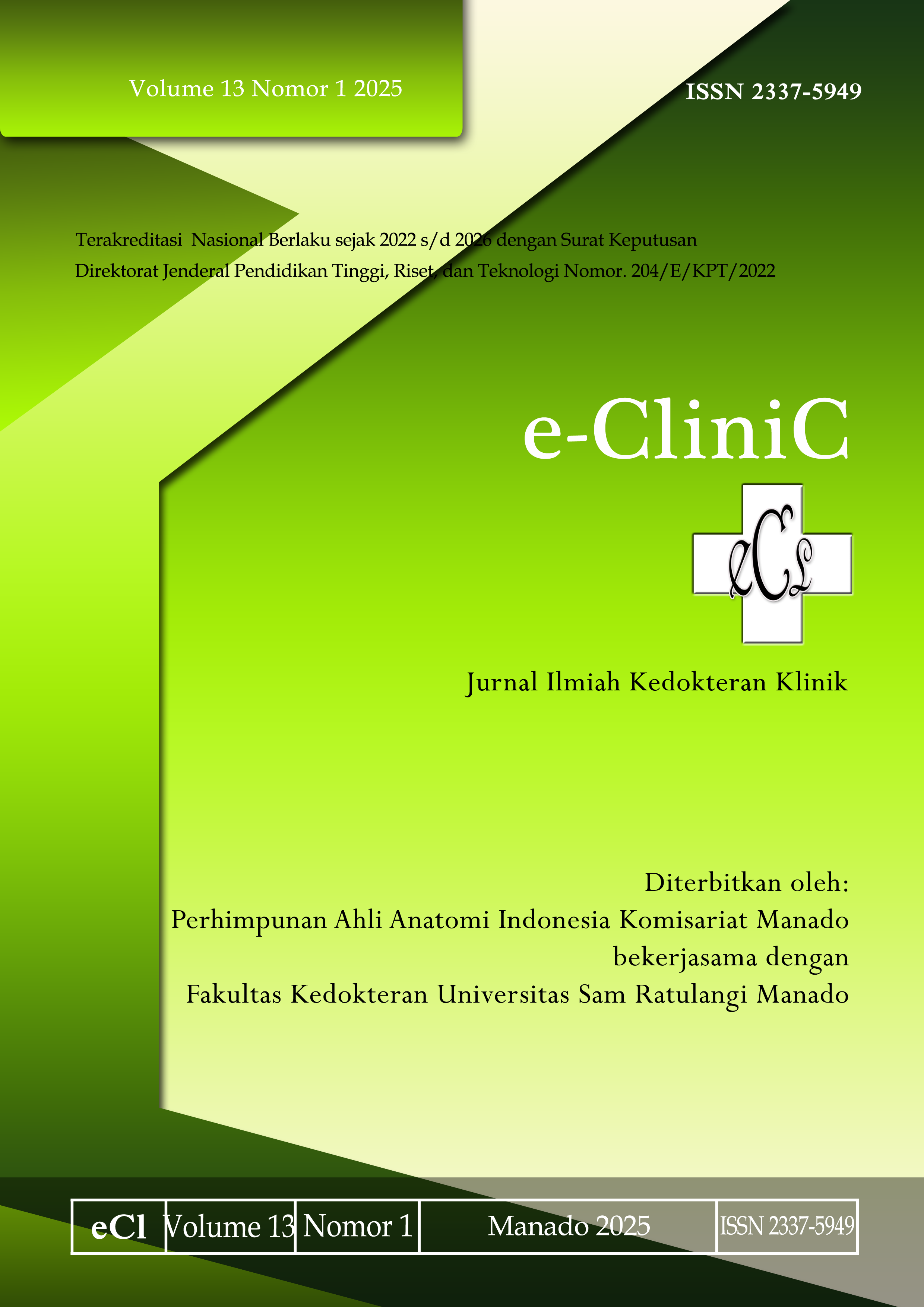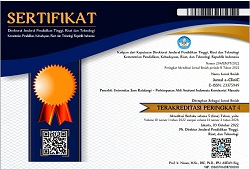Faktor Risiko Terjadinya Enterokolitis Nekrotikan pada Neonatus
DOI:
https://doi.org/10.35790/ecl.v13i1.59445Abstract
Abstract: Necrotizing enterocolitis is inflammation of babies' digestive tract and the main cause of morbidity and mortality of premature neonates in the NICU. The exact etiology of necrotizing enterocolitis is not known so far. This study aimed to determine prematurity, formula feeding, sepsis, anemia, congenital heart disease and preeclampsia/eclampsia in mothers as risk factors for necrotizing enterocolitis in neonates and other risk factors that influence the incidence of necrotizing enterocolitis. This was a quantitative and analytical study with a cross sectional design. Sampling techniques were total sampling of necrotizing enterocolitis cases (38 patients) and executive sampling for control cases (38 patients) admitted to Prof. Dr. R. D. Kandou Hospital Manado using data of medical records. The results of the distribution table analysis and chi-square test showed that the risk factors analyzed that had p<0.05, namely prematurity (p<0.001), and sepsis (p<0.001). Other variables did not have significant relationships with the incidence of necrotizing enterocolitis (p>0.05), as follows: formula milk consumption (p>0.387), anemia (p>0.234), congenital heart disease (p>0.556), and mothers with preeclampsia/ eclampsia (p>0.556). In conclusion, prematurity and sepsis are risk factors for necrotizing enterocolitis in neonates at Prof. Dr. R. D. Kandou General Hospital, Manado.
Keywords: risk factors; necrotizing enterocolitis; neonates
Abstrak: Enterokolitis nekrotikan (EKN) merupakan peradangan pada usus saluran cerna bayi yang menjadi penyebab utama morbiditas dan mortalitas neonatus prematur di NICU. Tingkat kematian EKN makin tinggi pada bayi yang lebih kecil. Sampai saat ini etiologi yang jelas mengenai EKN belum diketahui secara pasti. Penelitian ini bertujuan untuk mengetahui prematur, pemberian susu formula, sepsis, anemia, penyakit jantung bawaan, dan preeklamsi/eklamsi pada ibu sebagai faktor risiko terjadinya EKN pada neonatus, dan mengetahui faktor risiko lain yang memengaruhi kejadian EKN. Jenis penelitian ialah analitik kuantitatif dengan desain potong lintang. Teknik sampling penelitian ialah total sampling pada kasus EKN 38 pasien dan executive sampling pada kontrol EKN 38 pasien yang dirawat di RSUP Prof. Dr. R. D. Kandou Manado melalui sumber data rekam medis. Hasil analisis tabel distribusi dan uji chi-square menunjukkan bahwa faktor risiko yang dianalisis mempunyai p<0,05 ialah faktor prematur (p<0,001), dan sepsis (p<0,001). Variabel lainnya tidak hubungan bermakna dengan kejadian EKN dengan nilai p>0,05 sebagai berikut: pemberian susu formula (p>0,387), anemia (p>0,234), penyakit jantung bawaan (p>0,556), dan preeklamsi/eklamsi pada ibu (p>0,556). Simpulan penelitian ini ialah prematur dan sepsis merupakan faktor risiko terjadinya enterokolitis nekrotikan pada neonatus di RSUP Prof. Dr. R. D. Kandou Manado.
Kata kunci: faktor risiko; enterokolitis nekrotikan; neonatus
References
Thänert R, Keen EC, Dantas G, Warner BB, Tarr PI. Necrotizing enterocolitis and the microbiome: Current status and future directions. Journal of Infectious Diseases. 2021;223(3):S257-63. Available from: https://doi.org/10.1093/infdis/jiaa604
Wang Y, Song J, Sun H, Xu F, Li K, Nie C, et al. Erythropoietin prevents necrotizing enterocolitis in very preterm infants: a randomized controlled trial. J Transl Medical. 2020;18(1):1–9. Available from: https://doi.org/10.1186/s12967-020-02459-w
Akbar A, Ahmad S, Jabeen I, Ilyas S, Hassan Z, Kanwal K. Comparison of the frequency of necrotizing enterocolitis in preterm infants with formula feed versus breast feed. Medicalical Journal. 2023;30(04):496–500. Doi: 10.29309/TPMJ/2023.30.04.7354
Meister AL, Doheny KK, Travagli RA. Necrotizing enterocolitis: it’s not all in the gut. Bio Medical. 2020;245(2):85–95. Doi: 10.1177/1535370219891971
Siahaan ES, Dwihantoro A, Gunadi. Faktor prognostik kesintasan pasien enterokolitis nekrotikan di RSUP Dr Sardjito. Univ Gadjah Mada. 2020;1(1):1–7. Doi: 10.1038/s41598-022-17846-0
Alsaied A, Islam N, Thalib L. Global incidence of Necrotizing Enterocolitis: a systematic review and meta-analysis. BMC Pediatric. 2020;20(1):1–15. Doi: 10.1186/s12887-020-02231-5
Duess JW, Sampah ME, Lopez CM, Tsuboi K, Scheese DJ, Sodhi CP, et al. Necrotizing enterocolitis, gut microbes, and sepsis. Gut Microbes. 2023;15(1):2221470. Available from: https://doi.org/10.1080/ 19490976.2023.2221470.
Garg PM, De Plaen IG, Christensen RD, Khashu M, Dame C, Lavoie PM, et al. Current understanding of transfusion-associated necrotizing enterocolitis: review of clinical and experimental studies and a call for more definitive evidence. Newborn. 2022;1(1):201–8. Available from: https://doi.org/10.5005/jp-journals-11002-0005
Liu Y, Qiao L, Wu X, Jiang Z, Hao X. Predictive factors for the surgical treatment of necrotizing enterocolitis in preterm infants: a single-center retrospective study. BMC Pediatric. 2022;22(1):1–6. Available from: https://doi.org/10.1186/s12887-021-02973-w.
Lu C-Y, Liu K-F, Qiao G-X, Luo Y, Hui-Qing Cheng SZ. Risk factors for necrotizing enterocolitis in preterm infants: a meta-analysis. Chinese J Contemp Pediatric. 2022;24(8):908–16. Doi: 10.7499/j.issn.1008-8830.2202085
Diez S, Bell LE, Moosmann J, Weiss C, Müller H, Besendörfer M. Prediction of high bell stages of necrotizing enterocolitis using a mathematic formula for risk determination. Children. 2022;9(5):1–12.
from: https://doi.org/10.3390/children9050604
Tan X, Zhou Y, Xu L, Zhang L, Wang J, Yang W. The predictors of necrotizing enterocolitis in newborns with low birth weight: a retrospective analysis. Medical (United States). 2022;101(7):E28789. Digital Object Identifier: 10.3389/fped.2022.1079894
Fu Y, Ju R, Yue G, Xiao T, Zhang X, Gao S, Liu Y HX. Risk factors for necrotizing enterocolitis associated mortality. Pediatricic Medical. 2020;3(May):2. Doi: 10.1016/j.jgg.2021.04.002
Kordasz M, Racine M, Szavay P, Lehner M, Krebs T, Luckert C, et al. Risk factors for mortality in preterm infants with necrotizing enterocolitis: a retrospective multicenter analysis. Eur J Pediatric [Internet]. 2022;181(3):933–9. Available from: https://doi.org/10.1007/s00431-021-04266-x
Zouari M, Ben Ameur H, Ben Saad N, Rhaiem W, Ghariani O, Ben Hamad A. Predictive factors for mortality in pre-term neonates with necrotizing enterocolitis: a retrospective cohort study. Surg Infect (Larchmt). 2023;24(1):52-7. Doi: 10.1089/sur.2022.266
Cho H, Lee EH, Lee KS, Heo JS. Machine learning-based risk factor analysis of necrotizing enterocolitis in very low birth weight infants. Science. 2022;12(1):1–13. Available from: https://doi.org/10.1038/s41598-022-25746-6
Kaban RK, Rohsiswatmo R, Kautsar A, Sutrisno AA, Hikmahrachim HG, Hardiyanti N. Risk factors of necrotizing enterocolitis-related mortality and patient survival: a preliminary prospective study. Paediatrica Indonesiana. 2022;62(3):175–80. Available from: https://doi.org/10.14238/pi62.3.2022.175-80
Teišerskas J, Bartašienė R, Tamelienė R. Associations between red blood cell transfusions and necrotizing enterocolitis in very low birth weight infants: ten-year data of a tertiary neonatal unit. Medicina. 2019;55(1):1–7. Doi: 10.3390/medicina55010016
Savarino G, Carta M, Cimador M, Corsello A, Giuffrè M, Schierz IAM, et al. Necrotizing enterocolitis in the preterm: newborns medicalical and nutritional management in a single-center study. Ital J Pediatric. 2021;47(1):1–9. Doi: 10.1186/s13052-021-01180-8
Wang ZL, An Y, He Y, Hu XY, Guo L, Li QY, et al. Risk factors of necrotizing enterocolitis in neonates with sepsis: A retrospective case-control study. Int J Immunopathol Pharmacol. 2020;34(136). Available from: https://doi.org/10.3389/fped.2023.1242978
Zhongguo Dang Dai Er Ke Za Zhi. Analysis of influencing factors of necrotizing enterocolitis in premature infants and construction of an incidence prediction model. J Contemp Pediatric. 2022;25(1):41–8. Doi: 10.7499/j.issn.1008-8830.2020.02.011
Eberhart M, Grisold A, Lavorato M, Resch E, Trobisch A, Resch B. Extended-spectrum beta-lactamase (ESBL) producing Enterobacterales in stool surveillance cultures of preterm infants are no risk factor for necrotizing enterocolitis: a retrospective case–control study over 12 years. Infection. 2020;48(6):853–60. Available from: https://doi.org/10.1007/s15010-020-01453-0
Downloads
Published
How to Cite
Issue
Section
License
Copyright (c) 2024 Eoudia S. Palinggi, Jeanette I. Ch. Manoppo, Johnny L. Rompis

This work is licensed under a Creative Commons Attribution-NonCommercial 4.0 International License.
COPYRIGHT
Authors who publish with this journal agree to the following terms:
Authors hold their copyright and grant this journal the privilege of first publication, with the work simultaneously licensed under a Creative Commons Attribution License that permits others to impart the work with an acknowledgment of the work's origin and initial publication by this journal.
Authors can enter into separate or additional contractual arrangements for the non-exclusive distribution of the journal's published version of the work (for example, post it to an institutional repository or publish it in a book), with an acknowledgment of its underlying publication in this journal.
Authors are permitted and encouraged to post their work online (for example, in institutional repositories or on their website) as it can lead to productive exchanges, as well as earlier and greater citation of the published work (See The Effect of Open Access).







